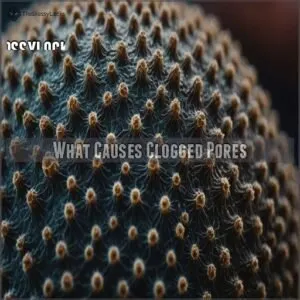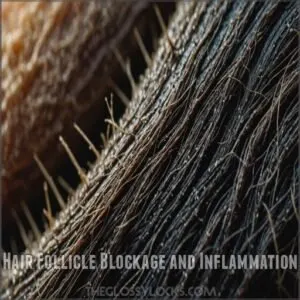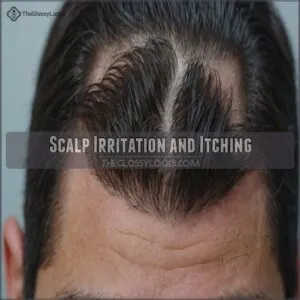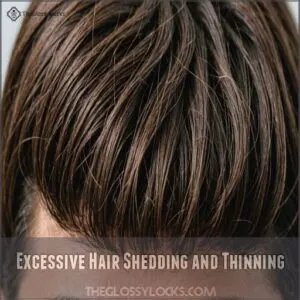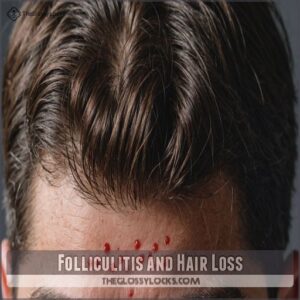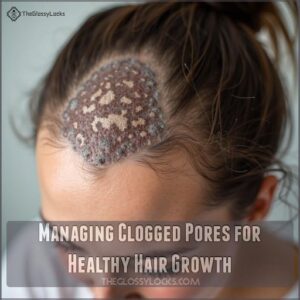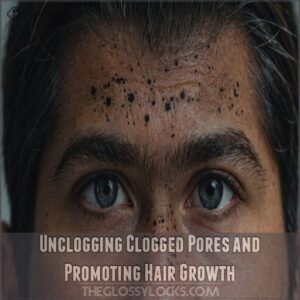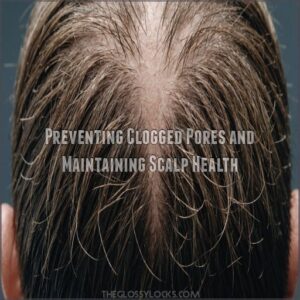This site is supported by our readers. We may earn a commission, at no cost to you, if you purchase through links.

Your scalp’s like a garden – it needs breathing room to flourish.
When pores get stuffed with oil, dead skin, and product buildup, they’re like choked plants.
This blockage can inflame hair follicles, leading to thinning and even hair loss.
It’s not just about looks; clogged pores can make your scalp itchy and uncomfortable.
But don’t panic! You’re not doomed to a life of hat-wearing.
With the right care, you can unclog those pores and get your hair thriving again.
From gentle exfoliation using methods like Korean chemical peeling, which dissolves dead cells for brighter skin, to smarter product choices, there’s a whole world of scalp-saving tricks waiting to be discovered.
Table Of Contents
- Key Takeaways
- What Causes Clogged Pores
- Effects of Clogged Pores on Hair Growth
- How Clogged Pores Prevent Hair Growth
- Managing Clogged Pores for Healthy Hair Growth
- Unclogging Clogged Pores and Promoting Hair Growth
- Preventing Clogged Pores and Maintaining Scalp Health
- Frequently Asked Questions (FAQs)
- How can I prevent clogged pores?
- How to prevent facial hair from growing back?
- Do enlarged pores always lead to clogged pores?
- Can a dermatologist help clogged pores?
- Are clogged pores on the face a problem?
- Are clogged pores dangerous?
- What’s the difference between a blocked hair follicle and folliculitis?
- Are blocked hair follicles contagious?
- Are blocked hair follicles caused by poor hygiene?
- Does diet affect blocked hair follicles?
- If I have this condition, will it definitely cause scarring and become unsightly?
- Can clogged pores stop facial hair growth?
- Does sebum prevent hair growth?
- Can dead skin stop hair growth?
- How to prevent hair follicles from clogging on face?
- Can certain hairstyles contribute to clogged pores?
- Are there specific foods that help unclog hair follicles?
- How does climate affect scalp pore health?
- Can scalp massages help prevent or treat clogged pores?
- Do hormonal changes impact the likelihood of clogged follicles?
- Conclusion
Key Takeaways
- Clogged pores can block hair follicles, leading to inflammation, thinning, and potential hair loss.
- Excess sebum, dead skin cells, and product buildup are the main culprits behind clogged pores on your scalp.
- You can manage clogged pores through gentle exfoliation, adjusting your hair care routine, and using scalp-friendly products.
- Maintaining a balanced diet, reducing stress, and avoiding harsh styling techniques will help prevent clogged pores and promote healthy hair growth.
What Causes Clogged Pores
You’ve probably noticed those pesky bumps on your scalp that seem to appear out of nowhere.
These clogged pores are often caused by a buildup of dead skin cells, excess oil, and bacteria.
This buildup can block your hair follicles, much like how hormonal influences during fetal hair development can disrupt the normal growth process in the womb, and hinder healthy hair growth.
Keratin Buildup and Bacteria
Ever wondered why your hair isn’t growing as it should?
Keratin buildup and bacteria might be the culprits.
These sneaky troublemakers can clog your pores, hindering healthy hair growth.
Here’s what you need to know:
- Excess keratin, a protein in your hair, can accumulate and block follicles.
- Bacteria thrive in this environment, causing inflammation and further blockage.
- The combo of keratin and bacteria creates a perfect storm for stunted hair growth.
Don’t let these microscopic menaces hold your locks hostage!
Sweat Glands and Skin Folds
Your sweat glands and skin folds play a big role in clogged pores.
These areas are hotspots for body odor and sweat production, which can lead to folliculitis and skin irritation.
And similar to how summer’s heat increases sweat and sebum production, sweat and sebum can contribute to a shiny complexion and exacerbate clogged pores.
Think of your armpits, under-breast area, and groin – they’re like little valleys where sweat and bacteria love to hang out.
Without proper hygiene practices, these spots can become breeding grounds for clogged pores, potentially hindering hair growth and messing with your scalp health.
Risk Factors and Symptomatology
Clogged pores don’t play favorites, but some folks are more likely to face this hair-growth hurdle.
You’re at higher risk if you:
- Have hormonal imbalances like PCOS
- Carry extra weight
- Have a family history of hidradenitis suppurativa
Watch for these telltale signs:
- Small, red, irritated pimples
- Painful, pus-filled lumps or cysts
- Itchy, sometimes bloody drainage
Don’t panic if you tick these boxes. Understanding your risk factors, such as the impact of low ferritin levels on hair growth ferritin levels and hair loss, is the first step to tackling clogged pores and getting your hair growth back on track.
Effects of Clogged Pores on Hair Growth
Your hair’s growth journey can hit a roadblock when pores get clogged. A fresh start for hair growth can be achieved by embracing the Big Chop and simplifying your hair care regimen, making it easier to maintain a healthy scalp and prevent clogged pores with regular washing and conditioning as part of a natural hair care routine. Your hair’s growth journey can hit a roadblock when pores get clogged.
Blocked follicles irritate your scalp and can also lead to hair thinning and shedding, throwing a wrench in your mane game.
Hair Follicle Blockage and Inflammation
Two major culprits behind hair growth woes are follicle blockage and inflammation.
When your pores get clogged, it’s like putting a cork in a bottle – nothing’s getting out.
This can happen when excess oil, dead skin cells, and debris combine to clog pores, as explained in a detailed guide on oily skin.
This blockage can lead to folliculitis, a pesky condition where your hair follicles become inflamed.
It’s not just uncomfortable; it can seriously hinder your hair’s ability to grow.
Think of it as a traffic jam on your scalp, preventing new strands from making their grand entrance.
Scalp Irritation and Itching
The discomfort of scalp irritation and itching can be maddening.
When clogged pores wreak havoc on your scalp, it’s not just annoying—it’s a red flag for your hair’s health.
You might find yourself scratching more often, feeling like your scalp’s on fire.
This constant irritation can lead to inflammation, making it harder for your hair to thrive.
Don’t ignore these signs; they’re your scalp’s way of crying out for help.
Excessive Hair Shedding and Thinning
You might notice more hair in your brush lately.
It’s not just your imagination – clogged pores can lead to excessive shedding and thinning.
Using a hair loss shampoo can help with this issue, but when follicles are blocked, they can’t support healthy hair growth.
This hair loss trigger can be sneaky, mimicking other issues.
Stress, hormonal changes, and poor scalp health all play a part.
But don’t worry!
Understanding the link between clogged pores and hair growth problems is your first step toward thicker, healthier locks.
How Clogged Pores Prevent Hair Growth
You’ll find it harder to grow healthy hair when excess oil, dead skin cells, and product buildup block your hair follicles.
Clogged pores can trap new hair growth beneath the surface, leading to inflammation and potential hair loss over time.
Sebum Buildup and Hair Growth Inhibition
A buildup of excess sebum around hair follicles acts like a cork, preventing healthy hair growth.
When your scalp produces too much oil, it mixes with bacteria and creates a sticky barrier that suffocates follicles.
Think of it as trying to grow a plant in waterlogged soil – it just won’t thrive.
This blockage can lead to inflammation, weakened roots, and eventually, noticeable hair thinning or loss.
Dead Skin Cells and Product Buildup
Scalp build-up isn’t just about excess oil – dead skin cells and product residue play a major role in blocking hair growth.
When these particles accumulate, they form a barrier that prevents new hair from breaking through.
Think of it like a garden: if there’s too much debris covering the soil, even the healthiest seeds can’t sprout.
Regular scalp exfoliation and switching to gentle products can help clear this unwanted build-up.
Folliculitis and Hair Loss
When folliculitis strikes, it’s like your hair follicles are under siege.
This painful inflammation develops when bacteria invade clogged pores, creating tender, pus-filled bumps that can disrupt hair growth.
Left untreated, chronic folliculitis may lead to permanent scarring and hair loss in affected areas.
Regular cleansing with antibacterial products, avoiding tight clothing, and maintaining proper scalp hygiene can help prevent these troublesome infections from taking root.
Managing Clogged Pores for Healthy Hair Growth
You’ll be happy to know that managing clogged pores doesn’t require expensive treatments or complicated routines.
With simple adjustments to your hair care habits and a few key lifestyle changes, you can keep your scalp healthy and your hair growing strong.
Exfoliating The Scalp and Adjusting Hair Care Routine
Frustrated scalps need regular exfoliation to break free from buildup that’s blocking hair growth.
Start with a gentle scalp scrub twice weekly – mix sea salt with olive oil for a DIY solution.
Adjust your washing schedule based on your scalp’s oil production – some need daily cleansing, while others thrive with twice-weekly washes.
Choose sulfate-free shampoos and always brush from roots to tips using natural bristle brushes.
Minimizing Heat Styling and Harsh Chemicals
Excessive heat styling and harsh chemicals can turn your healthy hair journey into an uphill battle.
Think of your scalp as a delicate garden – too much heat or chemical exposure can severely damage its ecosystem.
- Switch to air-drying whenever possible
- Use heat protectant products before styling
- Opt for sulfate-free, gentle shampoos
- Limit chemical treatments to every 8-12 weeks
- Choose natural alternatives like henna for coloring
Let your hair breathe by embracing its natural texture more often.
Maintaining a Balanced Diet and Reducing Stress
Your scalp’s health isn’t just about what you put on it – it’s also about what you put in your body.
A diet rich in vitamins C, D, E, and zinc helps regulate sebum production and promotes healthy hair growth.
You’ll also want to manage stress levels, as high cortisol can increase scalp inflammation and oil production.
Try meditation, yoga, or regular exercise to keep those stress hormones in check.
Unclogging Clogged Pores and Promoting Hair Growth
A well-balanced diet rich in foods to eat for healthy locks is essential for promoting a healthy scalp environment. You’ll be amazed at how simple treatments like salicylic acid peels and tea tree oil can transform your clogged pores into a healthy environment for hair growth.
Whether you’re trying cold showers or exploring professional treatments, you’ll find the right combination of solutions to get your hair flourishing again.
Using Salicylic Acid Peels and Tea Tree Oil
Tackling clogged pores head-on? Salicylic acid peels and tea tree oil are your dynamic duo. Here’s why they’re game-changers:
- Salicylic acid exfoliates, unblocking those stubborn follicles
- Tea tree oil’s antimicrobial properties fight off bacteria
- Together, they reduce inflammation and promote healthy hair growth
- DIY peels can be effective, but start with lower concentrations
Remember, consistency is key. Use these treatments regularly, but don’t overdo it. Your scalp will thank you, and those luscious locks will follow suit!
Trying Cold Showers and Gentle Shampoos
While hot showers feel great, they can actually harm your scalp and hair.
Switch to lukewarm or cool rinses to soothe your scalp and close those pores.
It’s like giving your hair a revitalizing splash!
Regarding shampoo, ditch the harsh stuff.
Opt for gentle, sulfate-free formulas that won’t strip your scalp’s natural oils.
Look for ingredients like tea tree oil or salicylic acid to keep those pores clear and your hair growing strong.
Considering Professional Treatments and DIY Remedies
Professional treatments can work wonders for clogged pores and hair growth.
Scalp exfoliation, micro-needling, and laser therapy are game-changers.
If you’re struggling to find the right products to tackle clogged pores, consider exploring online marketplaces that specialize in hair loss solutions.
But if you’re not ready to take the plunge, DIY remedies are also effective.
Whip up a scalp peel using Himalayan salt, lemon juice, and olive oil.
Massage it in, let it sit for 5-10 minutes, then rinse.
It’s like a spa day for your scalp!
Repeat as needed to kick those clogged pores to the curb.
Preventing Clogged Pores and Maintaining Scalp Health
You can take simple steps to keep your scalp healthy and prevent clogged pores.
By avoiding harsh treatments and using gentle products, you’ll create an environment where your hair can thrive.
Avoiding Harsh Shaving Techniques and Tight Hairstyles
You’ve been treating your hair right, but don’t forget about your scalp.
Harsh shaving and tight hairstyles can wreak havoc on your follicles.
To avoid clogged pores, consider the importance of pre-shave preparation techniques.
Here’s how to keep those pores happy and your hair growing strong:
- Ditch the dull razor – it’s like a lawnmower on your scalp!
- Say goodbye to super-tight ponytails – your hair needs to breathe.
- Embrace the gentle touch – your scalp will thank you.
- Give your head a break – constant styling is a recipe for clogged pores.
Remember, a happy scalp means healthy hair!
Reducing Hair Dye Use and Touching
Hair dye can be a double-edged sword for your locks.
While it’s fun to switch up your look, frequent coloring might irritate your scalp and clog those precious pores.
Try spacing out your dye jobs or exploring gentler, natural alternatives.
And let’s talk about those hands!
It’s tempting to run your fingers through your hair, but constant touching transfers oils and dirt, potentially blocking follicles.
Keep your hands off to give your hair room to grow.
Cleaning Hair Accessories and Using Gentle Products
Keeping your hair tools clean is just as important as watching what you put on your locks. Here’s a quick rundown:
- Wash brushes and combs weekly
- Sanitize hair ties and clips monthly
- Replace worn-out accessories regularly
Using a gentle scalp detox shampoo also helps to maintain scalp health. Try a silicone-free scalp detox shampoo for better results. Gentle products are your scalp’s best friends. Ditch those harsh chemicals and opt for silicone-free options. They’ll help prevent product build-up, reduce scalp irritation, and keep those pesky clogged pores at bay. While understanding the hair growth cycle, including its stages like the anagen phase, is crucial for a healthy scalp, keeping the scalp irritation-free helps. Remember, a happy scalp means healthier hair growth!
Frequently Asked Questions (FAQs)
How can I prevent clogged pores?
To prevent clogged pores, wash with gentle cleansers daily, exfoliate weekly, and avoid heavy products.
Don’t forget regular antibacterial soap treatments.
Wear breathable fabrics, and keep your scalp clean.
Use warm compresses.
How to prevent facial hair from growing back?
Looking for lasting smoothness?
Try laser hair removal, electrolysis, or waxing regularly.
You can also slow regrowth by using depilatory creams or prescription medications like Vaniqa that target hair follicles specifically.
Do enlarged pores always lead to clogged pores?
No, enlarged pores don’t automatically mean they’ll get clogged. While larger pores can collect more oil and debris, regular cleansing and proper skincare will help keep them clear and healthy.
Can a dermatologist help clogged pores?
Like a skilled detective, your dermatologist can diagnose and treat clogged pores through various methods.
They’ll examine your skin’s condition and recommend treatments like chemical peels, extractions, or medications to clear blockages.
Are clogged pores on the face a problem?
Clogged pores on your face can lead to acne, blackheads, and inflammation.
They’ll trap oil and bacteria under your skin, causing breakouts and uneven texture.
Regular cleansing and exfoliation help prevent these issues.
Are clogged pores dangerous?
When Sarah ignored her blocked follicles, they developed into painful abscesses.
While most clogged pores aren’t life-threatening, they can lead to infections, scarring, and skin damage if you don’t address them properly.
What’s the difference between a blocked hair follicle and folliculitis?
A blocked hair follicle is simply a clogged pore, while folliculitis occurs when that blockage becomes infected and inflamed.
Think of it like the difference between a traffic jam and a car accident.
Are blocked hair follicles contagious?
Despite affecting nearly 4% of the global population, blocked hair follicles aren’t contagious.
You can’t catch them from someone else – they’re caused by internal factors like keratin buildup, sweat, and bacteria within your follicles.
Are blocked hair follicles caused by poor hygiene?
No, blocked hair follicles aren’t caused by poor hygiene.
They’re typically the result of keratin buildup, sweat, and bacteria naturally occurring in your skin, regardless of how well you maintain your cleanliness routine.
Does diet affect blocked hair follicles?
Your diet plays a significant role in follicle health.
Foods high in sugar and unhealthy fats can increase sebum production, leading to blocked follicles.
A balanced diet rich in vitamins helps maintain clear, healthy follicles.
If I have this condition, will it definitely cause scarring and become unsightly?
Like a garden that can bloom again after winter, blocked follicles don’t always lead to permanent damage.
With proper care and early treatment, you won’t necessarily experience scarring or unsightly changes.
Can clogged pores stop facial hair growth?
Blocked hair follicles can definitely slow down or prevent facial hair growth.
When pores get clogged with oil and dead skin cells, it’s harder for hair to push through and grow normally.
Does sebum prevent hair growth?
Sebum doesn’t directly prevent hair growth, but excessive amounts can clog follicles.
This blockage may slow down or hinder hair growth.
Keeping your scalp clean and balanced helps maintain healthy sebum levels for ideal hair growth.
Can dead skin stop hair growth?
Yes, dead skin can indeed hinder hair growth.
When it builds up on your scalp, it can clog hair follicles, preventing new strands from emerging.
Regular exfoliation can help keep your scalp clear and promote healthy hair growth.
How to prevent hair follicles from clogging on face?
To keep your face’s follicles free and clear, channel your inner Renaissance master.
Cleanse daily with a gentle, non-comedogenic face wash.
Exfoliate weekly, moisturize, and avoid heavy makeup.
Don’t forget to change your pillowcase regularly—it’s a game-changer!
Can certain hairstyles contribute to clogged pores?
Certain hairstyles can indeed contribute to clogged pores on your scalp.
Tight ponytails, braids, or buns can trap sweat and oil, leading to buildup.
You’ll want to give your scalp some breathing room to prevent issues.
Are there specific foods that help unclog hair follicles?
Eating a balanced diet can help unclog hair follicles.
You’ll want to focus on foods rich in vitamins A, C, and E, as well as omega-3 fatty acids.
Think leafy greens, nuts, fish, and fruits like berries.
How does climate affect scalp pore health?
Like a plant in changing seasons, your scalp reacts to climate shifts.
Hot, humid weather can increase oil production, potentially clogging pores.
Conversely, cold, dry conditions may lead to flaky skin, affecting follicle health.
Adapt your hair care accordingly.
Can scalp massages help prevent or treat clogged pores?
Yes, scalp massages can help prevent and treat clogged pores.
They boost blood circulation, loosen buildup, and stimulate natural oil production.
You’ll relax and promote a healthier scalp environment for hair growth.
Do hormonal changes impact the likelihood of clogged follicles?
Hormones can indeed play a role in your follicular fate.
Changes in estrogen and testosterone levels may increase oil production, potentially leading to more clogged pores.
Don’t fret though – understanding these shifts can help you maintain a healthy scalp.
Conclusion
Just like a garden needs good soil to thrive, your scalp needs clear pores for healthy hair growth.
Remember, clogged pores can indeed prevent hair growth, but you’re not powerless.
By following a gentle scalp care routine, choosing the right products, and maintaining overall health, you can keep those pores clear and your hair flourishing.
Don’t let clogged pores hold your hair back.
With consistent care and attention, you’ll be on your way to a healthier scalp and fuller, more vibrant locks.

